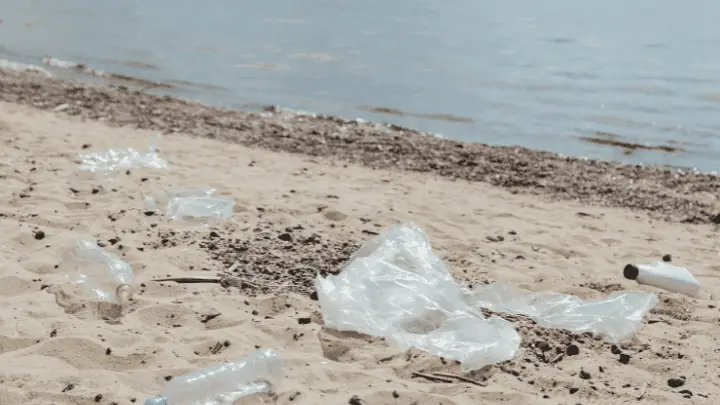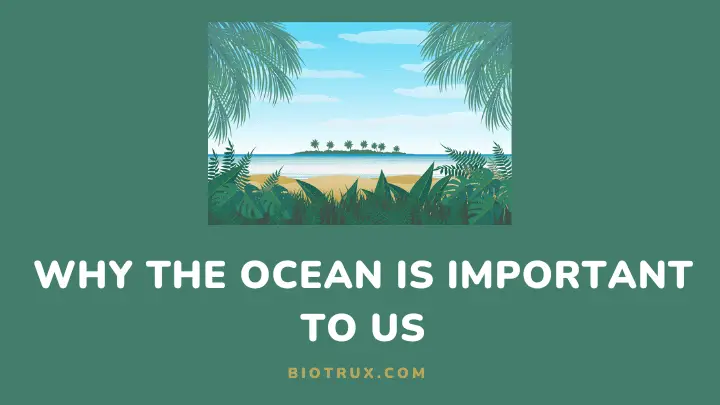As we look at the vast, seemingly endless expanse of ocean that surrounds us, it can be easy to forget its significance.
Despite the ocean’s sheer size and power, this vital resource impacts us in large and small ways. This includes everything from providing food and shelter to acting as a vital buffer against climate change. But why is the ocean so important?
This article will explore how integral the ocean is to our lives, why it needs our help, and what we can do to protect it. From coral reefs to the deep sea, we’ll dive into the depths of marine life and the importance of maintaining a healthy ocean ecosystem.
So come along with me and discover why the ocean is important to us.
1. Regulation of the Earth’s Climate
The ocean regulates the Earth’s climate by absorbing and storing heat and carbon dioxide. This prevents drastic temperature and atmospheric carbon level changes.
Through its capacity to absorb much of the planet’s heat, the ocean helps maintain a stable climate for human societies to thrive.
As the largest carbon sink on Earth, the ocean absorbs about 25 percent of all human-generated carbon dioxide from the atmosphere, helping to regulate the climate. This absorption prevents dangerous levels of atmospheric greenhouse gases from building up and warming the planet.
A changing ocean climate can cause marine life to suffer and disrupt ecosystems, reducing fisheries and other important resources. Therefore, protecting and preserving our oceans is essential if we are to preserve not only their unique biodiversity but also our future.
2. Home to An Incredible Diversity of Life
The ocean is home to an incredible diversity of life, with more than a million species of plants and animals. This biodiverse ecosystem serves many important roles for both humans and the environment.
Marine organisms are sources of food and medicine for people around the world. These organisms also provide habitats and regulate nutrient cycles, carbon sequestration, and climate.
Additionally, this biodiversity has cultural and aesthetic appeal, inspiring artists, writers, and scientists while providing recreational opportunities.
Additionally, studying marine organisms can provide insights into evolution, genetics, biochemistry, and human activities that affect the ocean. This deep appreciation for the intricate workings of marine ecosystems is invaluable to humanity and must be preserved.
3. The Ocean Supports Several Industries
The ocean is a vast source of essential resources that support industries such as fishing, shipping, and tourism. Fishing provides food and livelihoods to millions worldwide, while maritime trade facilitates economic growth.
Similarly, coastal regions are popular vacation destinations, providing recreational activities and opportunities for scientific research. The ocean is integral to our global economy and way of life.
Therefore, it is essential to protect its health and natural resources by implementing sustainable practices in each industry. Pollution reduction, habitat protection, and responsible fishing and shipping practices are vital to protect this ecosystem for future generations.
4. The Ocean Creates Jobs for Us
The ocean provides us with an abundance of opportunities. It feeds, fuels, and creates jobs for us all across the globe. Without the sea’s bountiful resources and powerful waves, we wouldn’t have the vibrant global economy that supports millions of families worldwide.
From fishermen to shipping companies, chemical engineers to marine biologists, the ocean is a source of livelihood for millions – and we still haven’t tapped into its full potential. With access to new technologies and innovative ideas, there are endless opportunities to explore.
By protecting and preserving our waters, we are opening up pathways to a brighter and more sustainable future.
5. Provision of Food, Global Trade, and Transportation
The ocean is more than just a vast expanse of blue. It provides food, global trade, and transportation – three key ingredients for a thriving world.
When it comes to sustenance, the ocean is brimming with both wild and farmed seafood. Fish, in particular, provide vital human nutrients, like protein and omega-3 fatty acids. And with improved farming methods and a better understanding of local ecosystems, sustainable catches have become even more plentiful.
The ocean also fuels global trade. Sailing vessels were once the only way to transport goods across open waters. Nowadays, cargo ships move everything from consumer electronics to automobile parts between continents daily.
Even when freight is moved over smaller distances, such as between coastal cities, water-based shipping is often cheaper and faster than other means of transport. Protecting and conserving our oceans is important, ensuring they remain healthy ecosystems for years.
6. The Ocean is Filled with Natural Resources Such as Oil, Gas, and Minerals
The ocean has been an invaluable human resource since the dawn of time. But we are just beginning to discover the vast bounty hidden beneath its waves – a wealth of mineral deposits, gas, and oil that can provide us with energy, materials, and much more.
From deep-sea oil rigs to mineral mining operations, seafloor exploration enables humans to access new sources of natural resources like never before. These resources are essential to our way of life – fuel ships, power homes, and the driving industry.
We rely on them for everything from pharmaceuticals to plastics and consumer electronics. But it’s not just about what we take out of the ocean – it’s also about what we put in. With mining operation comes environmental disruption.
That’s why it’s so important to understand the delicate balance between humans and the ocean and ensure we use the resources responsibly. It gives us so much – let’s ensure we give back.
7. Several Health Benefits
The ocean has long been revered for its many healing properties. From the ancient Greeks, who prescribed seawater for medicinal purposes, to modern research uncovering its many health benefits, the ocean is a powerful source of nutritious and therapeutic potential.
It offers essential nutrients, including iodine and iron, and exposure to salty sea air promotes physical and mental well-being. Studies have shown that spending time by the ocean can reduce stress levels, lower blood pressure, and soothe respiratory ailments.
It’s not just those who take to the seas in boats or surfboards who benefit; people living near the coast can also experience the health advantages of being close to the waves.
The calming influence of ocean sounds and smells can be felt far and wide, encouraging us all to slow down and appreciate the wonders of nature around us.
What Human Activities Harm the Ocean?

The ocean is under siege, and a thousand human activities are to blame. Overfishing, pollution, and mining have all taken their toll on marine life, while climate change has caused coral reefs to bleach and die, and warmer temperatures lead to ocean acidification.
Islands of plastic and other debris now float in the sea, trapping and killing birds, turtles, and other creatures unlucky enough to become entangled. Humans are slowly destroying the world’s greatest natural resource, from the tropics to the poles.
An urgent call for action must be heard before it’s too late — for if we do nothing, our oceans will soon be empty.
Mitigation Strategies to Protect the Ocean
The deep blue of our oceans is in desperate need of saving. Decades of human activities have left a devastating mark – from plastic pollution to overfishing and climate change. But there is still hope; with the right initiatives, we can restore the health of our marine ecosystems.
For example, ocean conservation organizations are working hard to reduce or outright ban single-use plastics, which account for 80% of all ocean debris. Governments are introducing fishery policies to manage fish stocks better and save overfished species from being wiped out altogether.
And renewable energy sources like wind and solar power are slowly replacing fossil fuels to combat global warming and the acidification of our oceans. Our future depends on taking action now before it’s too late. Protecting our ocean starts with us.
FAQs
How can individuals make a difference in protecting the ocean?
There are many ways that individuals can help protect the ocean. Reducing your use of single-use plastics, eating sustainably sourced seafood, and conserving water can all positively impact the ocean’s health.
Additionally, supporting conservation efforts and spreading awareness about the ocean’s importance can help raise public support for protecting our planet’s marine ecosystems.
How does the ocean contribute to the global economy?
The ocean is a major contributor to the global economy. It provides many resources, including fish, oil, natural gas, minerals, and tourism. The ocean also supports many jobs in the maritime industry, such as fishermen, shipbuilders, and marine biologists.
How does pollution impact the health of the ocean?
Pollution from human activities can seriously impact the ocean’s health. Plastic waste, oil spills, and chemical pollution can harm marine life and ecosystems, leading to declines in fish populations and other important resources. Pollution can also make seafood unsafe for human consumption.
The Ocean Is Important to Us; Let’s Protect It
The ocean is so much more than a body of water – it is an important part of our lives, from the sustenance we get from its resources to the biodiversity it supports. We must fight against threats such as pollution, global warming, and ocean acidification to protect ourselves and future generations.
We must be passionate about saving this vital resource for future generations so that they can experience its wonders just as we have. It may not be easy, but it is necessary if humanity is to continue thriving on this planet.
We can safeguard our future and create a healthier and cleaner ocean by working together and taking action. Let’s do our part today to protect this essential asset both now and in the future.
You can also learn more about US states that border the ocean.
Thanks for reading.

